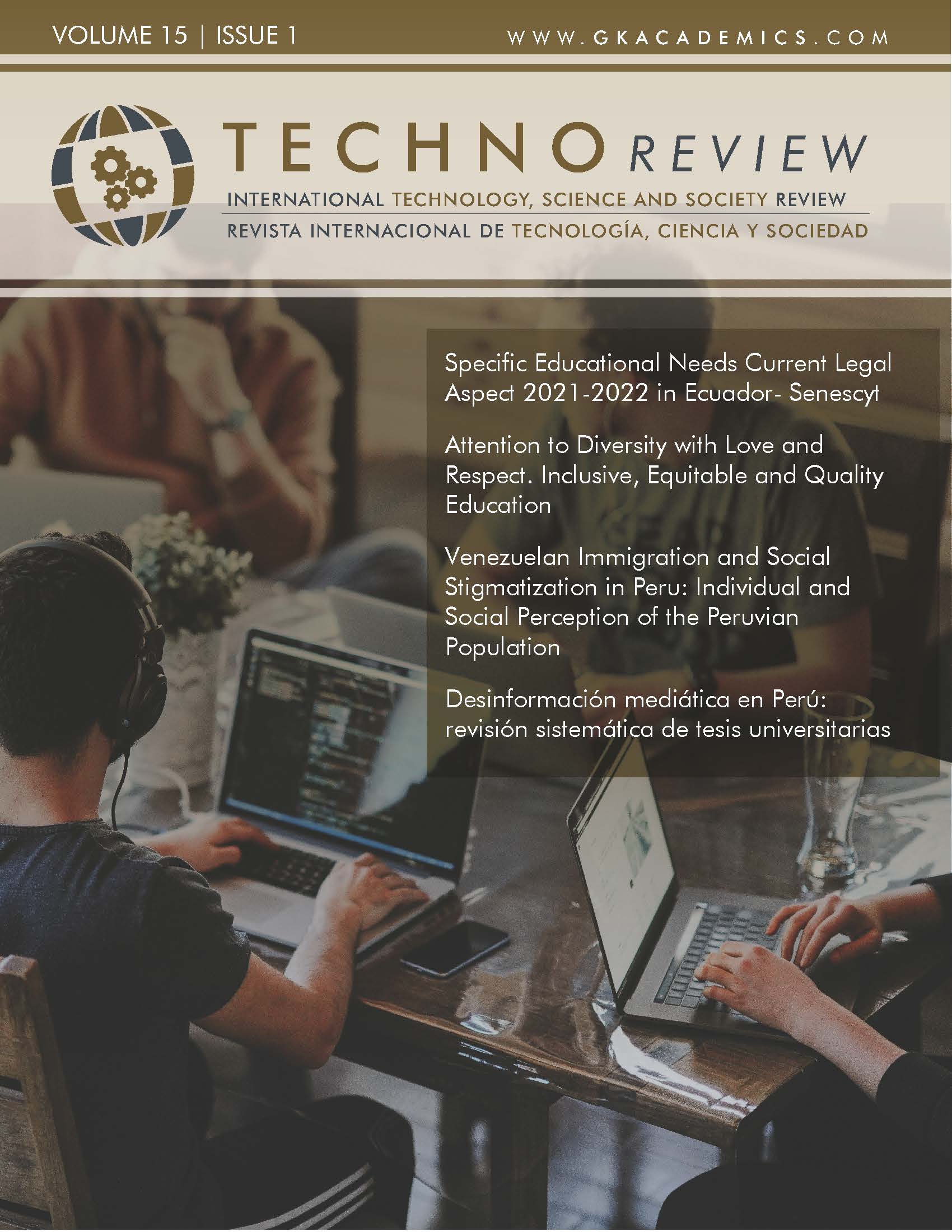Venezuelan Immigration and Social Stigmatization in Peru
Individual and Social Perception of the Peruvian Population
DOI:
https://doi.org/10.37467/revtechno.v15.5050Palavras-chave:
Social stigma, Stigmatization factors, Citizen perception, Venezuelan migration, PeruResumo
The political and humanitarian crisis in Venezuela has led to a forced exodus of approximately 4 million people, generating a significant impact in Latin America. Peru is one of the countries that has received a large number of Venezuelan migrants. This study focuses on the individual and social perceptions of Peruvians regarding the stigma towards Venezuelan immigrants in Peru. Factors of stigmatization such as labor competition, crime, and strain on public services are identified. Through a mixed-method approach of questionnaires and interviews, 180 Peruvian residents were surveyed.
Referências
Amri, S., & Bemak, F. (2012). Mental health help-seeking behaviors of muslim immigrants in the united states: Overcoming social stigma and cultural mistrust. Journal of Muslim Mental Health, 7(1), 43-63.
Chen, X., Stanton, B., Kaljee, L., Fang, X., Xiong, Q., Lin, D., Li, X. (2011). Social stigma, social capital reconstruction, and rural migrants in urban china: A population health perspective. Human Organization, 70(1), 22-32. https://doi:10.17730/humo.70.1.k76047734m703500.
Cohen, S. R., & Miguel, J. (2018). Amor and social stigma: ASD beliefs among immigrant Mexican parents. Journal of Autism and Developmental Disorders, 48(6), 1995-2009. https://doi:10.1007/s10803-017-3457-x.
Crandall, S., & Coleman, R. (1992). AIDS-related stigmatization and the disruption of social relationships. Journal of Social and Personal Relationships, 9, 163-177. https://doi:10.1177/026540407592092001.
Crocker, J., Major, B., & Steele, C. (1998). Social Stigma. In Gilbert, D., Fiske, S., Lindzey, G. (Eds.), The Handbook of Social Psychology (pp. 504-553). Academic Press.
DiComo, R. A., & Mychailyszyn, M. (2021). The relationship between stigma and helping-seeking behaviors among refugee, asylum seeker, immigrant (RASI) populations specifically of muslim origin. Journal of Muslim Mental Health, 15(2), 1-17. https://doi:10.3998/jmmh.130.
Fuster, M. (2011). The perception of stigma in people with HIV: its effects and ways of coping. National University of Distance Education.
Goffman, E. (1964). Stigma. La identidad deteriorada. Buenos Aires: Amorrortu.
Haghighat, R. (2001). A unitary theory of stigmatisation: Pursuit of self-interest and routes to destigmatisation. British Journal of Psychiatry, 178(03), 207-215. https://doi:10.1192/bjp.178.3.207.
Haghighat, R. (2005). The Development of an Instrument to Measure Stigmatization: factor analysis and origin of stigmatization. The European Journal of Psychiatry, 19(3), 144-154.
Igartua, J., & Cachón-Ramón, D. (2023). Personal narratives to improve attitudes towards stigmatized immigrants: A parallel-serial mediation model. Group Processes and Intergroup Relations, 26(1), 96-119. https://doi:10.1177/13684302211052511.
Jones, B., Victor, K. F., & Vannette, D. (2019). Alien citizens and the canonical immigrant: Do stigmatized attributes affect Latina/o judgment about discrimination? American Journal of Political Science, 63(4), 740-757. https://doi:10.1111/ajps.12465.
Kozlova, M. A. (2016). 'The race stigma': The coping strategies employed by migrants from the north caucasus in moscow. Zhurnal Issledovanii Sotsial'Noi Politiki, 14(3), 347-362.
Kunuroglu, F., van de Vijver, F. J. R., & Yağmur, K. (2021). Stigmatization of turkish return migrants in turkey. Turkish Studies, 22(1), 74-97. https://doi:10.1080/14683849.2020.1719360.
Li, J. (2021). Acculturation and social stigma: Mental health communicative action and help-seeking behaviors among chinese immigrants in the united states. International Journal of Strategic Communication, 15(5), 487-503. https://doi:10.1080/1553118X.2021.1984918.
Marichal, F., & Quiles, M. (2000). The organization of stigma into categories: updating Goffman's taxonomy. Psicothema, 12, 458-465.
McGuire, J., Li, X., & Wang, B. (2009). Social stigma and quality of life among rural-to-urban migrants in china: A comparison with their rural counterparts. World Health & Population, 11(2), 30-41.
Pinzani, A. (2020). Migration, poverty and social stigma. Under Word, (23), 239-260. https://doi:10.15366/BP2020.23.009.
Pouille, A., De Ruysscher, C., Vander Laenen, F., & Vanderplasschen, W. (2023). "Watch out for the boogieman": Stigma and substance use recovery among migrants and ethnic minorities. Journal of Community and Applied Social Psychology, 33(3), 571-586. https://doi:10.1002/casp.2657.
Quiles, M. N. (1998). Stigmatization and social marginalization of youth groups. Universidade da Coruña.
Stafford, M., & Scott, R. (1986). Stigma, deviance, and social control:Sorne conceptual issues. In S, Ainlay, G. Becker, L. Coleman, (Eds.), The dilemma of difference (pp. 77-91). Plenum Press.
Unal, B. (2016). Social and political dimension of stigmatization: The development of natasha and maria images for immigrants in istanbul. Migration Letters, 13(1), 159-168. https://doi:10.33182/ml.v13i1.270.
Vacca, R., Cañarte, D., & Vitale, T. (2022). Beyond ethnic solidarity: The diversity and specialisation of social ties in a stigmatised migrant minority. Journal of Ethnic and Migration Studies, 48(13), 3113-3141. https://doi:10.1080/1369183X.2021.1903305.
Wang, B., Li, X., Stanton, B., & Fang, X. (2010). The influence of social stigma and discriminatory experience on psychological distress and quality of life among rural-to-urban migrants in china. Social Science and Medicine, 71(1), 84-92. doi:10.1016/j.socscimed.2010.03.021.
Downloads
Publicado
Como Citar
Edição
Seção
Licença
Os autores/as que publicam nesta revista concordam com os seguintes termos:
- Os autores/as terão os direitos morais do trabalho e cederão para a revista os direitos comerciais.
- Um ano após a sua publicação, a versão do editor estará em acesso aberto no site da editora, mas a revista manterá o copyright da obra.
- No caso dos autores desejarem asignar uma licença aberta Creative Commons (CC), poderão a solicitar escrevendo a publishing@eagora.org







